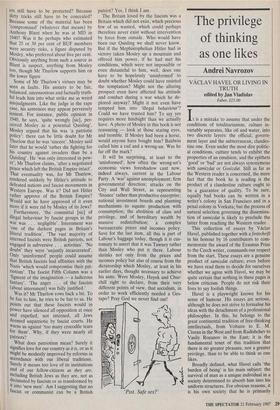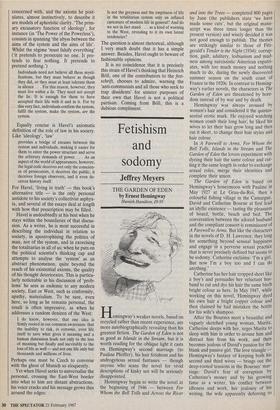The privilege of thinking as one likes
Andrei Navrozov
VACLAV HAVEL OR LIVING IN TRUTH edited by Jan Vladislav
Faber, f15.00
It is a mistake to assume that under the conditions of totalitarianism, culture in- variably separates, like oil and water, into two discrete layers: the official, govern- ment layer and the subterranean, clandes- tine one. Even under the most dire politic- al conditions, culture tends to exhibit the properties of an emulsion, and the epithets `good' or 'bad' are not always synonymous with samizdat or Gosizdat. Still as far as the Western reader is concerned, the mere fact that the book he is reading is the product of a clandestine culture ought to be a guarantee of quality. To be sure, equally bad books can be written in a writer's colony in San Francisco and in a penal colony in Vorkuta; but the process of natural selection governing the dissemina- tion of samizdat is likely to preclude the latter from reaching the Western reader.
This collection of essays by Vaclav Havel, published together with a festschrift in his honour by 16 contributors to com- memorate the award of the Erasmus Prize to the Czech writer, commands our respect from the start. These essays are a genuine product of samizdat culture; even before we have read them to decide for ourselves whether we agree with Havel, we may be quite certain that nothing in these pages is below criticism. People do not risk their lives to say foolish things.
Havel is a playwright known for his sense of humour. His essays are serious, although he does not strive to formalise his ideas with the detachment of a professional philosopher. In this, he belongs to the great continental tradition of free-thinking intellectuals, from Voltaire to E. M. Cioran in the West and from Radishchev to Vasily Rozanov in the East; it is the fundamental tenet of this tradition that there is no greater pleasure, nor a greater privilege, than to be able to think as one likes.
Broadly defined, what Havel calls 'the burden of being' is his main subject: the survival of man as a unique individual in a society determined to absorb him into his uniform structures. For obvious reasons, it is his own society that he is primarily concerned with, and the axioms he post- ulates, almost instinctively, to describe it are models of aphoristic clarity. 'The prim- ary excusatory function of ideology', for instance (in 'The Power of the Powerless'), consists in spanning 'the abyss between the aims of the system and the aims of life'. Whilst the regime 'must falsify everything' ('it pretends to persecute no one. It pre- tends to fear nothing. It pretends to pretend nothing.')
Individuals need not believe all these mysti- fications, but they must behave as though they did, or they must at least tolerate them in silence . . . For this reason, however, they must live within a lie. They need not accept the lie. It is enough for them to have accepted their life with it and in it. For by this very fact, individuals confirm the system, fulfil the system, make the system, are the system.
Equally concise is Havel's axiomatic definition of the role of law in his society. Like 'ideology', 'law'
provides a bridge of excuses between the system and individuals, making it easier for them to enter the power structure and serve the arbitrary demands of power . . . As an aspect of the world of appearances, however, the legal code deceives not only the conscien- ce of prosecutors, it deceives the public, it deceives foreign observers, and it even de- ceives history itself.
For Havel, 'living in truth' — this book's alternative title — is the only personal antidote to his society's collectivist asphyx- ia, and several of the essays deal at length with how that prescription may be filled.
Havel is undoubtedly at his best when he stays within the boundaries of that discus- sion. As a writer, he is most successful in describing the individual in relation to society, in apostrophising the politics of man, not of the system, and in exorcising the totalitarian in all of us; when he puts on the political scientist's thinking cap and attempts to analyse the 'system' as an abstract phenomenon, quite beydnd the reach of his existential axioms, the quality of his thought deteriorates. This is particu- larly noticeable in his discussion of 'prob- lems' he sees as endemic to any modern society, East or West, such as conformity, apathy, materialism. To be sure, even here, so long as he remains personal, the result is often impressive, as when he addresses a random denizen of the West:
I do know, however, that one idea is firmly rooted in our common awareness: that the inability to risk, in extremis, even life itself to save what gives it meaning and a human dimension leads not only to the loss of meaning but finally and inevitably to the loss of life as well — and not one life only but thousands and millions of lives.
Perhaps one must be Czech to converse with the ghost of Munich so eloquently.
Yet when Havel seeks to universalise the personal, crossing the East-West border into what to him are distant abstractions, his voice cracks and his message grows thin around the edges:
Is not the greyness and the emptiness of life in the totalitarian system only an inflated caricature of modern life in general? And do we not in fact stand . . . as a kind of warning to the West, revealing to it its own latent tendencies?
The question is almost rhetorical, although I very much doubt that it has a simple answer. Besides, Havel ought to beware of fashionable opinions.
It is no coincidence that it is precisely this strain of Havel's thinking that Heinrich Boll, one of the contributiors to the fest- schrift, chooses to admire, warning the `anti-communists and all those who seek to trap dissidents' for sinister purposes of their own that Havel is not a political partisan. Coming from Boll, this is a dubious compliment.



















































 Previous page
Previous page